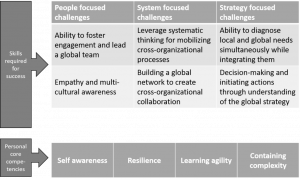The Global Leadership Model
Throughout years of working with global organizations and managers in global organizations, AKT has explored and discovered: the key challenges in the development of global leadership, and more importantly, the key and critical capabilities to succeed in these challenges – the global leadership model.
From AKT’s vast experience from working in a global environment, we have developed a model that presents the competencies and skills of global leadership, which is also a basis for training and management development. There are unique challenges to the world of global leadership, and they add more needed capabilities for managers to have in general.
The model is derived from the central challenges that focus on the areas of people, system and strategy. These challenges vary from organization to organization, yet in our experience we can derive three main areas of skill needs:
People-focused challenges
The distinction between task-oriented leadership and people-oriented leadership is an old one. Leaders should be focused on execution and implementation, but at the same time be able to address interpersonal issues. Therefore, leaders must build and maintain relationships by inspiring, developing others and leading a team.
In a global environment, this task becomes more complex and challenging due to the multicultural aspect and geographical distance.
The challenge of motivating physically distant global teams is always a major one. How do you motivate a geographically distant team? How do you create a sense of ‘team’, and how do you harness these teams for a common purpose? How do you develop them? How can do you build trust and support people who are geographically dispersed?
Engagement is a critical parameter for the organization and develops motivation, the feeling of being part of a team, and harnesses a common goal. Various studies show a direct relationship between employee engagement and employee behavior and business success. Highly engaged employees achieve good business results, are more committed to the organization, and strive to do much more than their disengaged peers. In global organizations, engagement is even more challenging and important, and is the glue that binds humans to the organization in a virtual environment.¹
The challenge of working in a multicultural environment is the ability to interact effectively with different cultures who follow different social-behavioral codes while developing self-awareness to cultural diversity and the cultural prejudices that each of us has.
In light of these challenges, we have identified two important interpersonal skills for the global leader:
- The ability to create engagement and motivate a global and geographically dispersed team
- Empathy and multicultural awareness
System-centric challenges
Another challenge in a global environment, is the ability to influence processes that exist in a global space without the manager necessarily having control over or influencing all processes and stakeholders. One of the ways to lead systemic influence is the ability to manage internal stakeholders. Leaders should develop their own influencing skills, defined as the ability to understand others and to leverage this understanding to influence the achievement of organizational goals.
The challenge of creating cooperation and building an organizational relationship system, in order to motivate broad processes, exists in every organization. The ability to do so in a global organization requires an understanding of an extensive system of organizational forces, a broad system wide perspective, and the ability to nurture and create cooperation in the organization. Without these, the leader will find it difficult to identify critical stakeholders and harness them in favor of processes that will advance the managerial and organizational tasks and objectives.
Skills identified as meaningful for dealing with system-focused challenges include:
- Leveraging systemic thinking to motivate cross-organizational processes
- Building a global network of connections to create cross-organizational collaboration
Strategy-focused challenges
The changing and global business environment requires organizations to regularly review and update their strategic directions.
At the same time, the products or services that organizations are required to offer are more complex, requiring a multi-disciplinary and boundary crossing approach.
Leaders must understand the local needs and constraints as well as the goals and global strategy, and try to connect them.
Managers are expected to be proactive, take initiative and create solutions that fit the organization’s strategic direction despite the urgent changes and uncertainty, and to lead their units to generate value that promotes the organization’s business strategy and objectives.
When making decisions, one must look at a systemic cross-organizational vision. Leaders should use better tools to understand how such systems behave, tools that can help understand the frequent interactions of multiple factors and the impact of extreme but one-time events.
In many ways, this is a wonderful era for decision makers in organizations. Analytics and advanced methodologies for analyzing information provide strong insights, and relying on solid and tangible information enables leaders to overcome the human limitations of different biases. Smart analytical systems for Big Data analysis and artificial intelligence can now identify patterns within complexity, perform network analysis (ONA) and deliver insights at a level that no human being can do himself. The challenge of leadership is to know how to ask intelligent questions, and to use the predictability of the Big Data to identify interactions that until recently were unrecognizable.
By taking risk management measures and preferring small failures in the initial stages, decision making processes can be approached with greater confidence and increased chances of success.
Skills critical to address these strategy-focused challenges include:
- Ability to identify and integrate local and global needs simultaneously
- Ability to make decisions and take initiative out of understanding global strategy

At AKT, we will help you better understand the challenges of global leadership development, the core capabilities and skills required to cope with these challenges, and development programs for your leaders.
Want to learn more about global leadership in the digital era? Email info@aktglobal.com to get more information from our Global Leadership experts.
